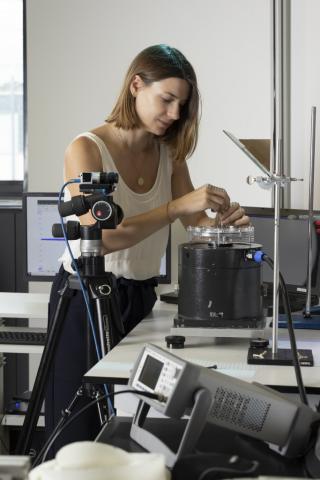
Anaïs Abramian
Physicist and Winner of the L'Oréal-Unesco Young Talent Award for Women in Science
Everyone agrees that women should have a place in science, but they remain less present in the highest positions.
Anaïs Abramian has become a specialist in the physics of natural disasters. Her work, which is in line with current climate issues, has been rewarded by the L'Oréal-Unesco Foundation for Women in Science.
As our planet gets warmer, more disasters will occur. Anaïs Abramian, a post-doctoral fellow at the Institut Jean le Rond d'Alembert, models the physical phenomena that cause disasters in order to better predict their risks.
Teacher or researcher?
Anaïs Abramian was born in 1991 and grew up in the 6th district of Lyon. Her parents encouraged their two daughters to pursue higher education. "There were no researchers in the family, but perhaps my mother had a curiosity for the sciences.” Anaïs liked science, obtained her baccalauréat in 2009 and entered the preparatory classes to pass competitive exams for entrance into the grandes écoles "without asking herself too many questions." Physics was already on her mind and one of her teachers transmitted his passion for the subject onto her.
Teaching physics is what interested her initially. So she entered the École normale supérieure (ENS) in Lyon in 2011, where a new world opened up to her. "We were strongly encouraged to do internships in experimental physics, which is how I discovered the world of research." During her four years at the ENS, she did an internship in astrophysics at the University of Aix-Marseille, then left for the New York University and returned to France, to the Institut de Physique du Globe de Paris (IPGP), to study fluid mechanics in greater depth and specialize in the modeling of natural phenomena, particularly geological ones. In her third year, she obtained an aggregation in physics, the prestigious qualification for teaching in secondary and higher education. But it was during her internship at the IPGP that she met Éric Lajeunesse and Olivier Devauchelle, who would become her thesis supervisors. "They are the ones who passed on their enthusiasm for the research profession and who motivated me to continue in academia."
A river runs through it
"My approach consisted of reproducing rivers in the laboratory by controlling parameters such as water or sediment flow to reveal the fundamental mechanisms." In this way, she shows that sediment transport dynamics are a key factor in the morphology of rivers, whether they form a single channel or braids.
In 2019, with her thesis in hand, after two research visits at Harvard University and then at Cambridge University, she joined the Institut Jean Le Rond d'Alembert at Sorbonne University. She is still working on granular media such as sand and pebbles, which represent 80 percent of the surface of our planet (seabed, soils, alluvial plains, deserts...), but is particularly interested in landslides. "Most natural phenomena involve a mixture of sand and water that induces cohesive forces between the grains. This is what happens in a landslide, a cohesive soil collapses. Better modeling of this type of flow would help predict natural disasters and improve land use planning." But not only that. Her work has industrial applications in the pharmaceutical, agri-food and construction sectors, where powders and granular media are numerous.
A helping hand
At the age of 30, Anaïs Abramian dreams of becoming a researcher or an associate professor. "I'm not the type of person who gets discouraged," she says, "but it's hard when you see so many brilliant people leaving research because of the lack of positions." For her, the L'Oréal-UNESCO Foundation's Young Talent Award comes at the right time. "It's a great recognition of my work. I received it at a time when reconciling my professional and personal lives was becoming difficult. It motivated me to continue my efforts to obtain a permanent position."
The Foundation also offers its laureates training programs, including on everyday sexism. "Everyone agrees that women have a place in science, but they are less present in the highest positions. We have to be careful of what is called benevolent sexism, which also contributes to the questioning of our skills. This training made me realize that this is not a trivial matter."
The young woman concludes: "Today, some women obtain high-level responsibilities, but this is not yet the case for most women. Luckily, I have always been supported, but you have to be careful not only for yourself, but also for others."
